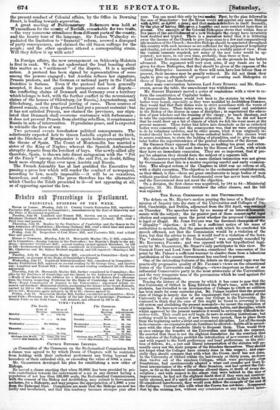In Foreign affairs, the new arrangement on Schleswig-Holstein is first
in rank. We do not understand the loud boasting about this matter as a " settlement " of the dispute. It is a mystifi- cation. A protocol has been signed by representatives of some among the powers engaged ; but Austria refuses her signature, Prussia protests, and the German or national party in the United Dutehies is furious. Even if the protocol had been generally accepted, it does not quash the permanent causes of dispute— the conflicting claims of Denmark and Germany over a territory whiehbelongs to both, with the further conflict in the reversionary claims of the houses of Oldenburg, (or Russia,) Augustenburg, and Gliickshurg, and the practical jarring of races. These sources of discord remain, even if the protocol had put a present restraint : but it has not satisfied Prussia, nor chained the provinces, nor stipu- lated that Denmark shall overcome contumacy with forbearance ; it does not prevent Prussia from abetting rebellion, it countenances Russia in acts of intervention. It proclaims peace, and is expected to rekindle the fires of war.
Two personal events foreshadow political consequences. The solicitously expected heir to Queen Isabella expired at its birth, and the Dutchess of Montpensier is again heiress-presumptive to the throne of Spain. The Count of Montemolin has married a sister of the Wing of Naples; whereat the Spanish Ambassador abruptly departs from the loveliest of bays. Our newly-allied ally therefore, Spain, is thrown into direct antagonism with the "Pet of the Fancy" among Absolutists ; the said Pet, no doubt, falling back more strongly than ever upon Austria and Russia. The French Assembly has at last gratified the Executive by passing a press law which will render the conduct of newspapers, according to law, nearly impossible—it -will be so vexatious, hazardous, and costly. The press therefore has the alternative which Charles the Tenth presented to it—of not appearing at all, or of appearing against the law.


























 Previous page
Previous page